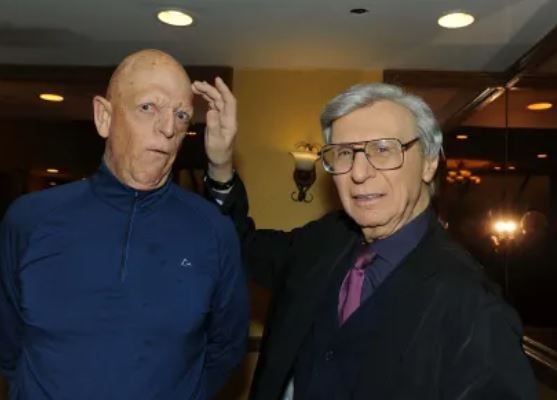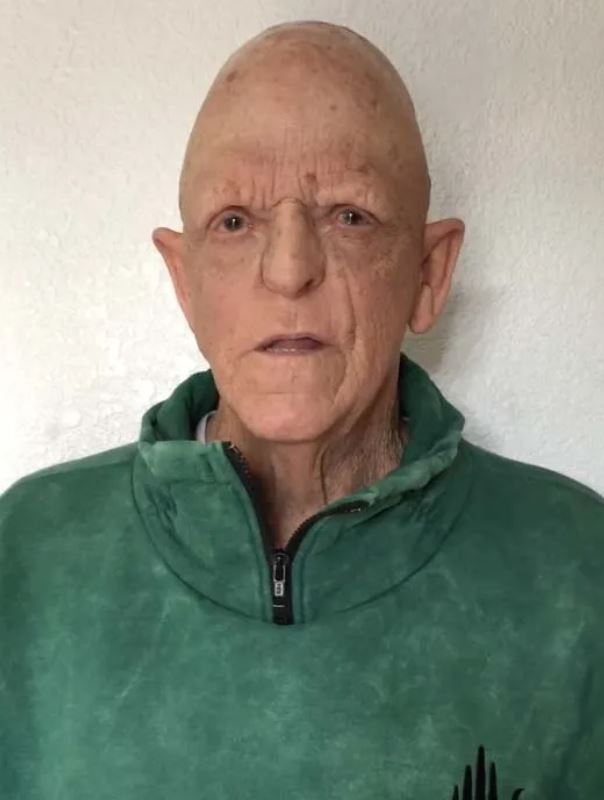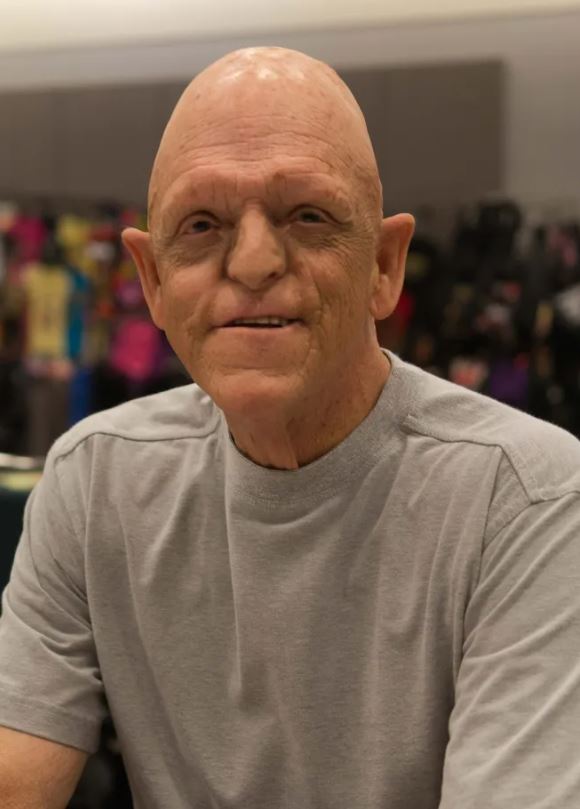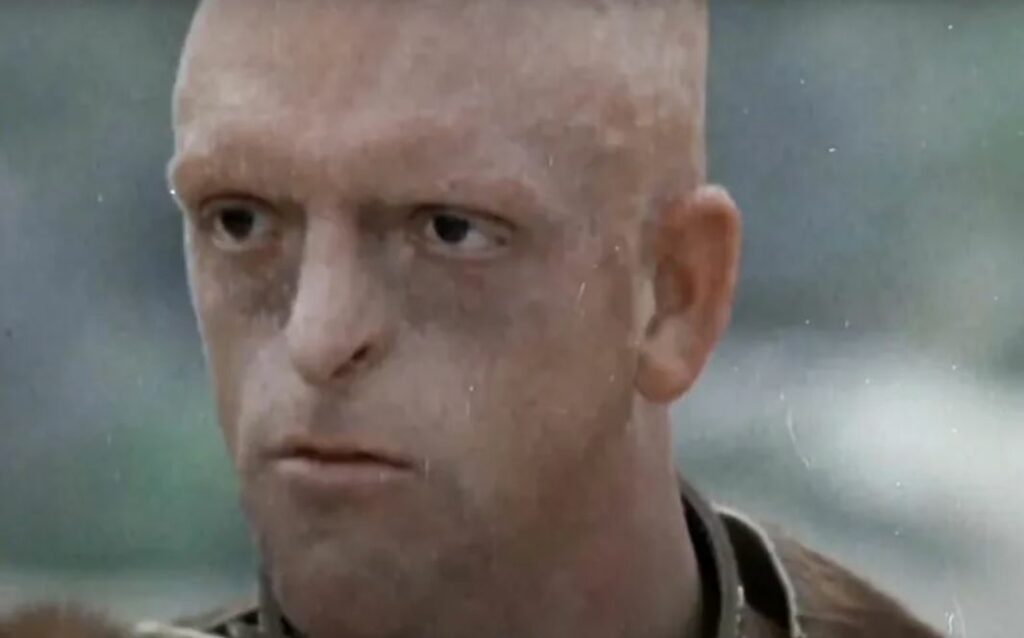For years, Michael Berryman has been a staple in the Hollywood scene, yet his journey there was anything but straightforward. Berryman’s life has been marked with challenges due to a rare congenital condition known as hypohidrotic ectodermal dysplasia.
However, his determination and positive outlook saw him chase his dreams relentlessly, leading him to an unquestionable level of success.
Comfort in one’s own skin is vital. Self-confidence is key, whether it’s related to being larger, thinner, taller, shorter, bald, hairy, or any other aspect of one’s appearance.
Everyone grapples with aspects of their lives that they may not be fully content with, but ultimately, it’s essential to feel comfortable and appreciated for who you are. Embracing your true self and moving away from seeking others’ approval is crucial, although it’s often easier said than done.

While some individuals may opt to alter their hairstyles, exercise, or even resort to surgical procedures to hide what they view as flaws, others feel a more profound transformation is necessary.
We want to reiterate the importance of following your intuition and making decisions that resonate with you. However, if you’re considering surgery for any reason, it’s highly recommended to consult a trusted specialist. Undertake comprehensive research as it’s your life that’s on the line.
As mentioned earlier, some people alter their bodies or appearances to lessen their discomfort, while others embrace their unique identities and remain unaffected by others’ opinions.
Actor Michael Berryman belongs to the latter group. Born with a rare congenital condition known as hypohidrotic ectodermal dysplasia, Berryman lacks hair, teeth, and fingernails, and his skull is uniquely shaped.
Many individuals with similar conditions might have felt apprehensive about chasing their dreams, but Berryman isn’t one to be easily discouraged. The actor achieved remarkable success, serving as an enduring beacon of inspiration for people worldwide throughout his life.

How did Berryman emerge as such a phenomenal actor? Let’s delve into his inspiring journey, and remember to share this post with your friends and family if it resonates with you.
Michael Berryman was born on September 4, 1948, in Santa Monica, California. From his very first day, he was destined to confront numerous challenges. That much was evident to most people who knew of his condition.
Berryman was born with hypohidrotic ectodermal dysplasia, a condition that rendered him without sweat glands, hair, or fingernails. Even though he was raised in sunny California, being out in the sun posed significant problems for him.
While genetic disorders can affect anyone, Berryman’s situation had a unique cause.
His father was a neurosurgeon in the US Navy, and following the US’s atomic bombing during World War II, he was deployed to Nagasaki and Hiroshima. His mission was to study the effects of radiation. Unbeknownst to him, his wife would soon become pregnant with Michael after his return home.
Speaking to the Lacomba Express, Berryman said, “I was the second born and had a series of birth defects, which can be traced back to the radiation exposure my father endured at ground zero of both an atom and a hydrogen bomb.”

“As a child, I gained a profound understanding of reality, human nature, and medical conditions,” Berryman further elaborated. He grappled with bullying and learned to discern between good and bad people.
Regardless, Michael Berryman refused to allow anything to deter him from pursuing his desired life. Surprisingly, acting was not initially his passion and it certainly wasn’t his dream profession.
Berryman moved away from his parental home and attended university to advance his education.
For two years, Berryman studied veterinary science at UC San Obispo. However, due to financial constraints, he had to abandon the program. Deciding to pivot, he opted to minor in art history while continuing his studies in theoretical physics. Eventually, he found his way back to Santa Monica, but was uncertain about his future direction.
“Instead of a flower shop, we had a store that sold house plants,” recalled Berryman. “Local artists would bring in their paintings and sculptures for us to display.”
Around 1973 or 1974, business was rather slow. Opposite us, however, was an upscale antique shop serving the affluent residents of Beverly Hills. They stocked items from the Ming Dynasty, ornate urns, and various other antiques. As we enjoyed a good rapport with our neighboring businesses, we were able to plant some palm trees when Gala Mofrey, an antique shop across the street from our own in Venice, held a significant sale.
“We tidied up the area. It was during the evening’s wait for the sale to end that I met Producer George Pal. Once the event concluded, we moved any unsold plants back to our store,” Berryman narrated.
Acclaimed director George Pal was alerted to Berryman’s presence by his son who managed the neighboring antique shop. Pal approached Berryman with a proposal to portray a particular character in his forthcoming film, Doc Savage. Without much hesitation, Michael agreed to play the role of Juan Lopez Morales, the film’s chief coroner.
Berryman recalled, “I thought this could be fun,” and he thoroughly enjoyed his two days of shooting at Herald Lloyd’s estate.
When the film was released, George Pal, impressed by Berryman’s performance, took the initiative to write a letter of introduction to the Screen Actors Guild. This allowed Michael to formally join and, technically, embark on a career as an actor. Berryman found himself with the means to pursue acting as a full-time profession, but he was unsure whether acting was his true vocation.
In fact, he had planned to move to Alaska, but an unexpected opportunity compelled him to put those plans on hold. He received a phone call.
Berryman recounted, “The casting directors, Michael Fenton and Jane Feinberg, called from George Pal. They were also casting for the highly acclaimed film One Flew Over the Cuckoo’s Nest, which was nominated for seven Oscars.”
Berryman’s big break came in the form of his role in Jack Nicholson’s One Flew Over the Cuckoo’s Nest. As it happened, his unique appearance was exactly what was needed for him to stand out.
Michael described how he was invited into a meeting by Joel Douglas, the son of Kirk Douglas and brother of Michael Douglas.
“They said, ‘We’ve seen your photo from George Pal. You have the look we’re after for a lobotomized patient named Ellis,” Berryman remembered in a 1995 interview.

“We began conversing, and I shared my medical background knowledge. My mother worked as a nurse, and my father was a neurosurgeon. Therefore, I had a deep-seated intuition about hospitals and institutionalization.
“They initially wanted me solely for my distinctive look, but after conversing with me, they realized I possess the intellect and sensitivity to perform the role,” he elaborated. Consequently, there was no need for me to audition.
With only two acting roles under his belt, Michael Berryman’s career trajectory was showing immense potential. He had transformed from a relative unknown to a recognized figure in the industry almost overnight. He credits Bandon Lee and Michael Landon for profoundly influencing his acting career.
While One Flew Over the Cuckoo’s Nest marked a significant success, it paled in comparison to what awaited Berryman.
In 1977, Berryman was cast in The Hills Have Eyes. His performance in One Flew Over the Cuckoo’s Nest had caught the attention of director Wes Craven. Much like his previous film roles, it was Berryman’s distinctive look that drew Craven towards him.
Berryman commented, “They had seen me in Cuckoo’s Nest, and reasoned that the family probably had mutations due to living on a bomb range. My agent arranged a meeting with the producers and Wes, and he laid out the backstory of the Bean family, explaining that it was largely factual.
It seemed to align with the Hills’ narrative as I was born with certain deformities resulting directly from radiation exposure.
When they said they cast me based on my appearance, I replied, ‘Well, I hope my performance will meet your expectations,’ and I believe it did.”
After The Hills Have Eyes, Berryman gained a significant following among the horror aficionados.
When it comes to cult actors who portray mutants, monsters, or other horrifying characters, no one can boast a larger dedicated fanbase than Michael Berryman. His portrayal of the terrifying Pluto is still a topic of discussion today.
The success of ‘The Hills Have Eyes’ surpassed Berryman’s initial expectations.
To this day, whenever the movie is discussed, his performance invariably becomes a talking point.
“It’s a wonderful feeling, primarily because of the bonds we formed,” he said. “Wes’s exceptional screenplay, direction, and production of the film amassed a cult following for us. It’s masterfully crafted and stands alone,” he observed. “Hills was meticulously assembled. Some of the more recent horror films flit between obsession with gore, special effects, and so on. It’s been a privilege to work with Wes on multiple occasions.”
After his triumph in ‘The Hills Have Eyes’, Berryman found no dearth of work opportunities. He starred in several science fiction and fantasy films, including ‘Evil Spirit’ and ‘My Science Project’. He reprised his role as Pluto in ‘The Hills Have Eyes Part II’ in 1984.
Berryman also gained recognition for his guest appearances on ‘The X-Files’ and ‘Star Trek: The Next Generation’. He even appeared twice in music videos by Motley Crue. Currently, Berryman boasts over 100 acting credits to his name.
A dedicated organic farmer and chef, he’s a big fan of Rachel Ray. He never allowed his distinctive appearance to hinder his pursuit of his dreams, and it’s hoped that his inspiring journey can provide motivation to those battling prejudice or adversity.
Berryman shared a word of advice, “Don’t take yourself too seriously, and ensure you laugh at least once daily.
I encourage you to be lazy as it only takes three muscles to smile, but 27 to frown.”




